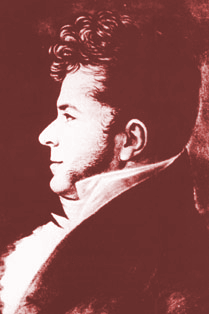On October 2, 1812, Marie-Henri Beyle, better known as Stendhal, writes, from occupied Moscow about music. "It looks like I'll spend the winter here," Stendhal writes to his friend Felix Faure. "I hope there'll be some concerts. There will certainly be theatrical performances at the Court, but what kind of actors will be in them?" he continues.
Stendhal is serving as a quartermaster in Napoleon's Grand Armée. He is recovering from a serious fever which had the benefit of giving him some time to be alone and read. "Cette maladie m'a été agréable en me donnant huit jours de solitude," he writes. His letter next turns towards a discussion of music:
Caleb Crain has a much better translation in the Comments section below. It reads:
1. This my poor and very quick translation from the French which needs some work. The French reads as follows: "Rien ne me purifie de la société des sots comme la musique; elle me devient tous les jours plus chère. Mais d'où vient ce plaisir? La musique peint la nature, Rousseau dit que souvent elle abandonne la peinture directe impossible, pour jeter notre âme, par des moyens à elle, dans une position semblable à celle que nous donnerait l'objet qu'elle veut peindre. Au lieu de peindre une nuit tranquille, chose impossible, elle donne à l'âme la même sensation en y faisant naître les mêmes sentiments qu'inspire une nuit tranquille". Stendhal's letter in French can be found here and here.
Stendhal is serving as a quartermaster in Napoleon's Grand Armée. He is recovering from a serious fever which had the benefit of giving him some time to be alone and read. "Cette maladie m'a été agréable en me donnant huit jours de solitude," he writes. His letter next turns towards a discussion of music:
Nothing cleanses me of society's fools like music; everyday it becomes ever more rich. But where does this pleasure come from? Music paints nature but, as Rousseau says, it is often impossible to paint something directly. Rather, music puts our soul in a states like what we would like to paint. Instead of painting a [quiet] tranquil night, which is impossible, it gives the soul the same sensation by giving birth to the same feelings that inspire a [quiet] tranquil night [1].Update
Caleb Crain has a much better translation in the Comments section below. It reads:
Nothing cleanses me after the company of fools like music; every day it becomes dearer to me. But where does this pleasure come from? Music depicts nature, and Rousseau says that often music abandons impossible direct depiction in order to throw our soul, by music's own means, into a position like the one that we would be given by the object that the music is trying to depict. Instead of depicting a calm night, an impossible thing to do, music gives the soul the same feeling, by causing to be born in our soul the same sentiments that a calm night inspires.Notes
1. This my poor and very quick translation from the French which needs some work. The French reads as follows: "Rien ne me purifie de la société des sots comme la musique; elle me devient tous les jours plus chère. Mais d'où vient ce plaisir? La musique peint la nature, Rousseau dit que souvent elle abandonne la peinture directe impossible, pour jeter notre âme, par des moyens à elle, dans une position semblable à celle que nous donnerait l'objet qu'elle veut peindre. Au lieu de peindre une nuit tranquille, chose impossible, elle donne à l'âme la même sensation en y faisant naître les mêmes sentiments qu'inspire une nuit tranquille". Stendhal's letter in French can be found here and here.

Hmm. I'd translate it more like this: "Nothing cleanses me after the company of fools like music; every day it becomes dearer to me. But where does this pleasure come from? Music depicts nature, and Rousseau says that often music abandons impossible direct depiction in order to throw our soul, by music's own means, into a position like the one that we would be given by the object that the music is trying to depict. Instead of depicting a calm night, an impossible thing to do, music gives the soul the same feeling, by causing to be born in our soul the same sentiments that a calm night inspires."
ReplyDeleteMuch much better. Thanks. If you don't mind, I will add your translation to the post above. Thanks again.
Delete